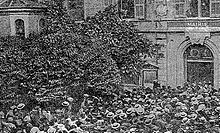You can help expand this article with text translated from the corresponding article in French. (August 2021) Click for important translation instructions.
|
| Monégasque Revolution | |||
|---|---|---|---|
| Date | 16 March 1910 – 5 January 1911 | ||
| Location | Monaco | ||
| Caused by |
| ||
| Goals |
| ||
| Resulted in | Concessions given to protesters
| ||
| Parties | |||
| |||
| Lead figures | |||
| |||
| Units involved | |||
| Part of a series on the |
|---|
| History of Monaco |
 |

The Monégasque Revolution (French: révolution monégasque) was a series of confrontations by the subjects of Monaco against their ruler, Prince Albert I. It led to the end of absolute monarchy with the promulgation of the Constitution of Monaco the following year.
Popular demands
The subjects had several grievances against the prince. There was severe unemployment as the country lacked farmlands or factories and the gaming establishment banned the hiring of the prince's subjects. Their national pride was hampered by a poor reputation as "the moral cesspool of Europe". In addition, the prince spent his money in France rather than at home. They demanded a constitution and a parliament with the threat of overthrowing the monarchy and establishing a republic should the prince fail to comply. Other demands included the termination of Camille Blanc and Roland Bonaparte's monopoly over the gaming establishment, the removal of French citizens from state offices, and the separation of the prince's finances from the state's.
In early March 1910, a delegation made up of Suffren Peymond, Théodore Gastaud, André Marsan and Charles Bellando de Castro arrived to deliver an ultimatum to the prince. Later that month, the prince acquiesced to their demands. For the rest of the year, there were protests against French domination of Monaco's government and economy. The Prince's Palace was also stormed by an angry mob that looted the palace. The prince escaped with the help of the Compagnie des Carabiniers du Prince, and stayed in France until the riots died down. Soldiers of the Compagnie did try to defend the palace but ultimately failed after the day-long riot.
Constitution
On 5 January 1911, a new constitution was promulgated. Nevertheless, Prince Albert I still wielded considerable power and suspended the constitution during World War I. After Prince Albert I's death in 1922, The New York Times published a 1921 interview with him on the process and his views on the need for the 1911 revolution.
See also
References
- "EVENTS THAT MADE THE HISTORY OF 1910---WHAT THEY WERE, WHERE THEY HAPPENED AND THE CHIEF ACTORS IN THEM; Crash of Absolutism and the Growth of Republican Ideas" (PDF). The New York Times. January 1, 1911. Retrieved 2010-10-29.
- "MONACO GETS CONSTITUTION.; Prince Albert Proclaims It as Gift to His 1,200 Subjects" (PDF). The New York Times. Monte Carlo. January 8, 1911. Retrieved 2010-10-29.
- "MORE REFORM IN MONACO.; Prince Albert Surrenders Control of the Government Finances" (PDF). The New York Times. Monte Carlo. October 16, 1910. Retrieved 2010-10-29.
- "RIVIERA SEASON OPENING.; Changes Wrought by the New Political Status of Monaco" (PDF). The New York Times. Monte Carlo. October 23, 1910. Retrieved 2010-10-29.
- Radoman, Milena (January 27, 2011). "La constitution a 100 ans". Monaco Hebdo. Retrieved December 26, 2015.
- "THRONE OF THE PRINCE OF MONACO IN DANGER; "Constitution or Revolution" the Ultimatum from Half the Subjects of the Little Kingdom" (PDF). The New York Times. March 13, 1910. Retrieved 2010-10-29.
- "MONACO TO HAVE PARLIAMENT; Prince, Heretofore Absolute, Decides to Meet Wishes of Subjects" (PDF). The New York Times. Monte Carlo. March 29, 1910. Retrieved 2010-10-29.
- "MONACO IS SHOWING ENMITY TO FRANCE; French Government Following Events in Little Principality with Close Attention" (PDF). The New York Times. Paris. November 27, 1910. Retrieved 2010-10-29.
- "IS MONACO DOOMED? OTHER NATIONS WANT IT; Germany, Italy and France Cast Envious Eyes on the Little Principality and Its Own People Demand a Republic" (PDF). The New York Times. December 11, 1910. Retrieved 2010-10-29.
- "THE PARADOX; How Late Prince Had Fairly to Force Constitution on His Reluctant People Usual Jubilation Absent. The Prince's Explanation. A Personal Appeal. The Gambling Contract". The New York Times. July 2, 1922. Retrieved 2011-08-15.
This European history–related article is a stub. You can help Misplaced Pages by expanding it. |
This article about politics in Monaco is a stub. You can help Misplaced Pages by expanding it. |
